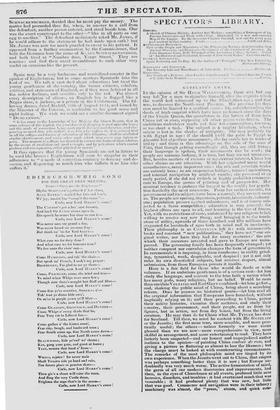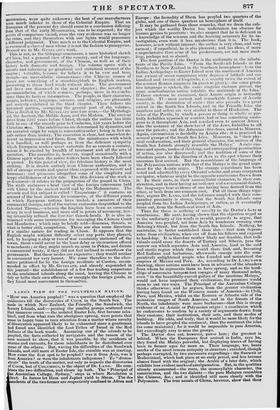CIUTZLAFF'S CHINA.
IN the opinion of Sir 'Incas !VI M.0 IMMIX', there was but one way left for a man to signalize himself, after the exploits which the world had witnessed up to the Elizabethan age; and that
was, to discover the North-west Pasa■re. We presume his deci- sion must be limited to a nautical :ense : fo'r, notwithstanding the deeds of high emprize which have been peslinmet1 since the days of the Virgin Queen, the speculators in the lottery of fame have China yet in store, supposing all other prizas ‘rere drawn. The ambitious undertaker needs not fear too commonplace, too easy, or too short a task. The subject is a mighty kitigdotn, wInEe origin is lost in the shades of antiquity. She may probably vie with Egypt in age : if she should yield the palm to Egypt in
gigantic but objectless monuments, she far excels her in works of
utility: and there is this advantage on the side of the sons of Fold, that though getting exceedingly old, they are still living; their language is spoken, their muniments call be read ; the people are mummy-looking, it is true, but they are not mummies. But, besides matters of curious or mysterious interest, China has
other claims on our attention. With her originated many useful manufactures, many important arts : the silk and porcelain trades are entirely hers ; so are suspension-bridges, terraced agriculture, and internal navigation by artificial canals ; she possessed at an early period, if she did not (which is highly probable) communi- cate to Europe, the germs of printing and of gunpowder. lIcr nominal territory is perhaps the largest in the world ; her popula tion decidedly the most numerous. From her earliest records, the government and its subjects have been a marvel : they are now more so. The people are sparing, ingenious, patient, laboriously, i ndustri - ous ; population presses against subsistence, and is of course sub- jected to a fierce competition ; education is very general; the highest ollices are open to all, and learning is the test of fitness. Yet, with no restrictions of caste, unfettered by any religious belief, willing to receive any, new thing, and bringing it to the touch- stone of utility, upwards of three hundred and fifty millions have stagnated for hundreds of ages both in mind and in mechanic=. Their philosophy is as CONFUCI us left it : with innumerable hooks and constant " new publications," they have not " one ori- ginal writer, nor have they had for many centuries:" the arts which their ancestors invented and gave to Europe are unim- proved. The governing family has been frequently changed; yet neither conquest nor convulsion changes the form of government. In ceremonials it is imposing, in form cumbrous; in reality grind- ing, tyrannical, weak, despicable, and despised : yet it not only rules its own dissatisfied subjects, but receives respect, almost submission, from those European powers it insults. Here is a fair field fur those who would do deeds or write volumes. If an ambitious gentleman is of a serious cast—let him study the language, and convert to the true faith a nation which has many gods, many religions, but no belief. Would he more than emulate VOLTAIRE and Earl GREY combined—let bins go fort.,, and, shaking the public mind of China, bring about a searching reform. Does he possess an historical genius—let him read all the original information that Europeans have furnished, without implicitly relying on it; and then proceeding to China, peruse their native histories, examine their archives, and study their country, their government, and their people, not as from lay figures, but in action, not from dry bones, but from the living creature. Ile may thus do for China what Mr. TYTLER has done for Scotland. Till then, we must be content with Mr. GUTZLAFF or the Jesuits; the first more true, more sensible, and more prac- tically useful; the others— unless formerly we were easier pleased than we are now—more comprehensive in view, more skilful in arrangement, and more entertaining to read. They have latterly been suspected—and our honest and unprejudiced author inclines to the opinion—of painting China couleur de rose, and giving a picture so flattering as almost to lose the likeness ; but the charge must be looked at with counteracting circumstances. The remarks of the most philosophic mind are tinged by its own experience. When the Jesuits went out to China, that empire was perhaps something better than it is now ; but Europe un- doubtedly was very much worse. The active fermentation of mind, the germ of all our modern discoveries and improvements, had then, in the eyes of Churchmen at all events, produced little save heresies, disorders, and troubles : it had overturned much that was venerable ; it had produced plenty that was new, but little that was good. Commerce and navigation were in their infancy; machinery was almost, the "press," steam, and quick CoM' munication, were quite unknown; the best of our manufactures were much inferior to those of the Celestial Empire. That an European of the present day should come to a conclusion differing from that of the early Missionaries, was to be expected; for the points of comparison varied, even the very evidence was no longer the same, and they themselves with our lights would pronounce a different judgment. Thus much as to the Celestial Empire, and in excuse of a class of men whom it is not the fashion to panegyrize. Proceed WC to Mr. GUTZLAFF'S work.
This is not, as the titlepage announces, a more historical sketch of China, but a general view of the country, and of the language, character, and government, of the Chinese, as well as of their history both domestic and foreign. The volume opens with a minute and informing geographical and statistical account of the empire ; valuable, because we believe it to be new and true, though—an unaN oiaable circumstance—the Chinese names of places are something of a stuniblingblock to English readers, presenting to them hard words without ideas. The government and laws are discussed in the next chapter ; the novelty and recommendation of which consists, perhaps, more in its conclu- sions than its facts or information. The people, in their character, usages, industry, language, sciences, and religion, are pleasantly and naively exhibited in the third chapter. Then follows the historical portion, occupying the greater part of the volumes. This is dividA by Mr. GUTZLAFF into four arras,—the Mythologi- cal, the Ancient, the Middle Ages, and the Modern. The ancient dates from 2207 years before Christ, though the author has little faith in any of the records prior to Confucius, 550 years before the Christian sera. The subdivisions are determined by dynasties, and are narrated reign by reign in consecutive order ; being in fact an- nals rather than history. The execution is clear, but somewhat de- ficient in impression and force, from the minuteness with which it is handled, as well perhaps as from the deficient sympathy which European readers must entertain for so remote a country, unless it be excited by breadth of treatment and all the arts of narration. The narrative is, however, tinged occasionally with a Chinese spirit when the native writers have been closely followed or quoted. In this point of view, the fabulous history is the most striking. It is drawn entirely from Chinese authorities, and is full of strange events and quaint ideas expressed with naivete and terseness; and possesses altogether some of the simplicity and happy childishness of a fair tale. The fifth division of the work is professional—it relates to the propagation of the gospel in China. The sixth embraces a brief view of the foreign intercourse held with China by the ancient world and by the Mahometans. The seventh and last subject is called " Emporiums :" it contains an account of the best stations for commerce, of the different points at which European nations have traded, a narrative of their commercial doings, and of the various embassies despatched to the Celestial Throne,—wherein the English have been as successful as any in real business, and more stiff in points of ceremony, hav- ing invariably refused the Rory-tow (knock-head). It is also in- termixed with some instructions for managing the Chinese Court and Mandarins ; which may be briefly told—firmness, threats, or what is better still, compulsion. There are also some directions of a similar nature for trading in China. It appears that the English might without difficulty select any ports they pleased, and, by keeping a ship or two of war constantly stationed off the towns, there would never be the least delay or obstruction offered to merchants; or they might march an army to Pekin, and dictate a commercial treaty, if they did not feel inclined to overthrow the government. But these modes are expensive : they would neither be convenient nor very honest. We conic therefore to the alter- native petitioned for by the fureign residents at Canton, recom- mended in effect by Mr. GUTZLAFF, and already expounded in this journal—the establishment of a few free trading emporiums on the unclaimed islands along the coast, leaving the Chinese to defy or bribe their own officials, or smuggle the foreign goods, as they found most convenient to themselves.





















 Previous page
Previous page